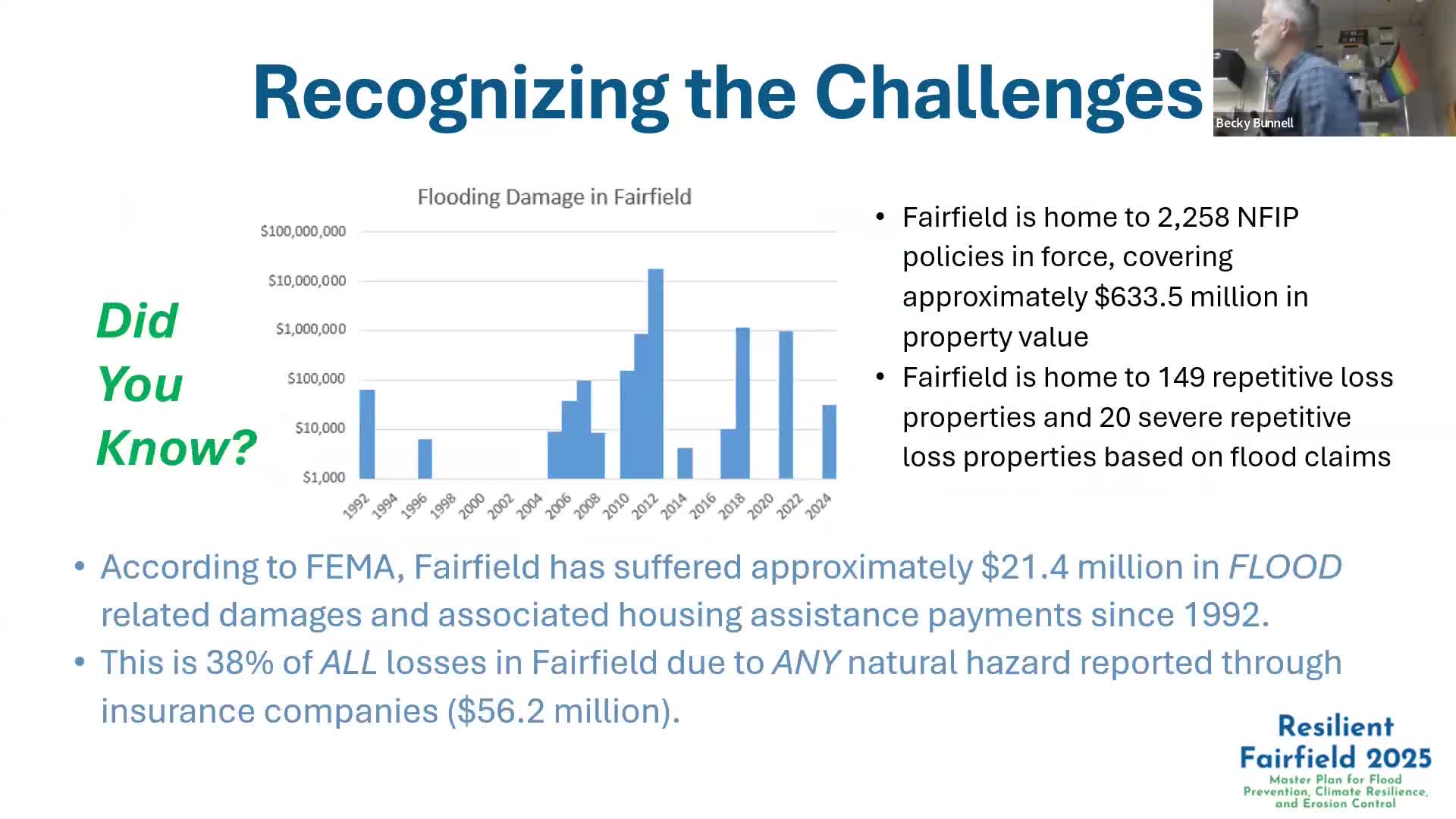Fairfield develops flood mitigation master plan amid rising natural hazard costs
March 02, 2025 | Fairfield, Fairfield, Connecticut
This article was created by AI summarizing key points discussed. AI makes mistakes, so for full details and context, please refer to the video of the full meeting. Please report any errors so we can fix them. Report an error »

The Town Council of Fairfield, Connecticut, convened a special meeting on March 1, 2025, to address critical issues surrounding flood protection, climate resilience, and erosion control. The meeting highlighted the pressing need for comprehensive strategies to mitigate the impacts of flooding and related natural hazards in the community.
A key point of discussion was the current state of flood insurance in Fairfield, with over 2,000 policies in force. However, it was noted that approximately 50 properties have made multiple claims, indicating a significant number of flood losses that may not be captured in official statistics. The council acknowledged that many homeowners, particularly those without mortgages, are not required to carry flood insurance, potentially leaving them vulnerable to unreported losses.
The meeting underscored the alarming statistic that more than one-third of all natural hazard losses in Fairfield are flood-related. This figure does not account for uninsured losses, suggesting that the actual impact of flooding could be much greater. The council discussed the increasing severity of precipitation events and flash flooding, which have become more frequent in recent years. The need for a master plan to address these challenges was emphasized, focusing on both immediate and long-term solutions.
Participants explored various flood mitigation strategies, including elevating homes and deploying temporary barriers before storms. The council aims to develop a prioritized list of these approaches, complete with cost estimates for permanent solutions. Additionally, the integration of these strategies into the town's capital improvement plan was deemed essential for securing future grants, particularly from FEMA, which remains a vital resource for funding.
The meeting concluded with a commitment to update existing hazard mitigation plans and ensure that the new strategies are effectively incorporated into ongoing town planning efforts. The council recognized the urgency of addressing flood risks and the importance of proactive measures to safeguard the community against future climate-related challenges.
A key point of discussion was the current state of flood insurance in Fairfield, with over 2,000 policies in force. However, it was noted that approximately 50 properties have made multiple claims, indicating a significant number of flood losses that may not be captured in official statistics. The council acknowledged that many homeowners, particularly those without mortgages, are not required to carry flood insurance, potentially leaving them vulnerable to unreported losses.
The meeting underscored the alarming statistic that more than one-third of all natural hazard losses in Fairfield are flood-related. This figure does not account for uninsured losses, suggesting that the actual impact of flooding could be much greater. The council discussed the increasing severity of precipitation events and flash flooding, which have become more frequent in recent years. The need for a master plan to address these challenges was emphasized, focusing on both immediate and long-term solutions.
Participants explored various flood mitigation strategies, including elevating homes and deploying temporary barriers before storms. The council aims to develop a prioritized list of these approaches, complete with cost estimates for permanent solutions. Additionally, the integration of these strategies into the town's capital improvement plan was deemed essential for securing future grants, particularly from FEMA, which remains a vital resource for funding.
The meeting concluded with a commitment to update existing hazard mitigation plans and ensure that the new strategies are effectively incorporated into ongoing town planning efforts. The council recognized the urgency of addressing flood risks and the importance of proactive measures to safeguard the community against future climate-related challenges.
View full meeting
This article is based on a recent meeting—watch the full video and explore the complete transcript for deeper insights into the discussion.
View full meeting
